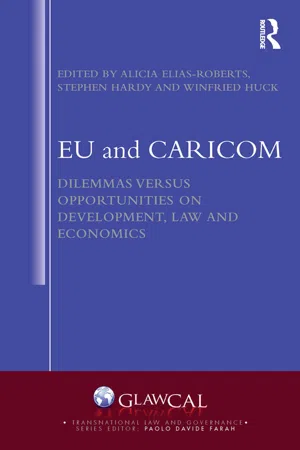
EU and CARICOM
Dilemmas versus Opportunities on Development, Law and Economics
- 206 pages
- English
- ePUB (mobile friendly)
- Available on iOS & Android
EU and CARICOM
Dilemmas versus Opportunities on Development, Law and Economics
About This Book
Investigating the unique EU-CARICOM legal relationship, this book explores
the major theme of globalisation, which shapes inter-regional organisations
individually and determines their relationship to one another. It evaluates how
EU-CARICOM relations have fostered trade, security and other development
measures, reflecting on the past, future and present of the Caribbean states that
are active in the EU-CARICOM framework.
Providing case studies on key issues such as immigration, tax and energy, it
examines the impact that the EU-CARICOM has on the slave trade and the
deportation of millions of people. Such bitter experiences still indirectly shape
culture, hopes and the economic framework of possibilities today; therefore, the
focus of the volume is on the issues which the constant stream of globalisation
creates. The book assesses many potential impacts that the agenda of the EU
and Brexit pending will have upon the EU-CARICOM relationship, given the
potential for these to create instability.
Overall, it highlights how the EU and CARICOM are representations for
multilateralism and serve as models that provide the basis for many successful
initiatives and agreements. In all new agreements and negotiations, the will to
accept the Sustainable Development Goals and thus to make inequality, climate
change and other goals of the SDGs the basis of an order that puts people
at the centre, are evaluated, and the global agenda 2030 and its impact on
EU-CARICOM.
Overall, it highlights how the EU and CARICOM are representations for
multilateralism and serve as models that provide the basis for many successful
initiatives and agreements. In all new agreements and negotiations, the will to
accept the Sustainable Development Goals and thus to make inequality, climate
change and other goals of the SDGs the basis of an order that puts people
at the centre, are evaluated, and the global agenda 2030 and its impact on
EU-CARICOM.
Frequently asked questions
Information
Part I
Brexit and EU-CARICOM relations
2
The impact of Brexit
Brexit: the changing legal order
- legislation which relies on an EU regulator or grants jurisdiction to the CJEU;
- numerous treaties which have been signed by the EU and are currently directly applicable in the UK by virtue of s. 2(1) of the European Communities Act 1972; and,
- the fact that references in EU laws to actions being taken within the EU will not cover actions taken within the UK after 31 January 2020.
UK post-Brexit: ‘in search of a new legal order’
Table of contents
- Cover
- Half Title
- Series Page
- Title Page
- Copyright Page
- Contents
- List of contributors
- Foreword from the Editor-in-Chief for the gLAWcal Book Series “Transnational Law and Governance”, Routledge Publishing – Professor Paolo Davide Farah
- Foreword from the President of the Caribbean Court of Justice – The Honourable Justice Mr Adrian Saunders
- List of abbreviations
- Introduction
- Part I Brexit and EU-CARICOM relations
- Part II Trade and security in EU-CARICOM
- Part III Taxation and immigration in EU-CARICOM
- Part IV Sustainable development and regional governance issues in the EU-CARICOM
- Conclusions
- Index